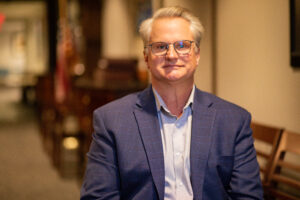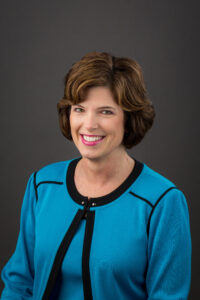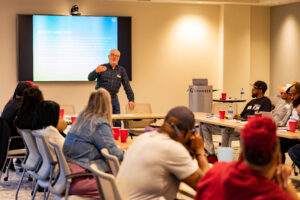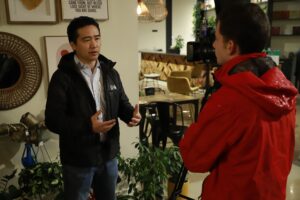SHAINA RANTUNG
Callie Starnes experienced the full spectrum of local news media working at WRCB Channel 3 as a reporter/anchor in 2008, then on to news director in 2016. Initially from the Atlanta area, she thought living in Chattanooga would be temporary. But after being a part of this community for over a decade, Starnes and her family now call Chattanooga home.
Trend: What are your daily responsibilities as a news director?
Starnes: It is different every day. I am responsible for content across all newscasts — about 35 hours of broadcast a week — and all content across digital platforms, which includes our website, news and weather apps, social media and OTT (streaming via the Internet) products. I have a midlevel management team that helps me accomplish all that; there's no way one person can have eyes on all of that!
A big chunk of my job is quality control when it comes to content, but then I also manage the staff of the news department, consisting of about 50 journalists who I'm responsible for. I take that job very seriously because that's an opportunity to invest in people.
Trend: How did all that change because of COVID?
Starnes: I think everybody's lives changed; the difference was ours changed rapidly. March, Friday the 13th, that was the day that the first case was announced in Hamilton County. There were rumors and reports coming into the news department all the time that there was a case, so there was a constant preparation for big news coverage. Are we going to have enough people to write all the stories?
And then it shifted to how do we keep our people safe. Within a few weeks, we were able to accomplish getting about 60-70% of the news department force remote. Now looking back at it all these months later, it is incredible we were able to accomplish that. My team was given a very detailed staff coverage plan that we had developed so that they would have directions as to where they were supposed to be and not supposed to be to keep them safe. I cannot say enough of the way my team responded at that moment.
Trend: If someone wanted to pitch you for a news or feature interview, what top three tips would you give them?
Starnes:
1. Understand who to send tips to. Know your audience.
2. Relationships matter.
3. Respect the deadline.
Trend: How would you handle an uncomfortable or closed off interviewee?
Starnes: I think a lot of times when that happens, it's two people not connecting. As we just talked about respecting the journalist and the deadline, it's also important for the journalist to respect the person that they're interviewing, and that be mutual. Sometimes if you just take a little bit of time with an interviewee to ensure that everybody feels comfortable, engaging in the conversation, understanding what your goals are as a journalist for the story, and just getting to know somebody for a few minutes really can go a long way to making that a more comfortable situation.
Trend: You've worked in Chattanooga for over a decade. What are the biggest changes you've seen in the community?
Starnes: Growing up in the Atlanta area, I remember Chattanooga and what it was as a kid. And it isn't like anything like that now. I remember coming here in 2008 and being just floored by the Riverfront and how beautiful it was. VW came shortly after I came to town; it was this big moment, and since then, it's changed so much.
I love what has happened with the local business/entrepreneur effort in town. I love to see local restaurants and local businesses. A lot of that Chattanooga vibe that I think has only grown and expanded at least in the time I've been here; it makes it so much easier to sell Chattanooga to someone who's considering a position… In fact, I don't have to sell Chattanooga. I think that has changed a lot over the course of time that I've been here. That quality of life is really important, and to journalists who are considering multiple cities that are looking for their next position, [we want to give] them the opportunity to explore the Riverfront, to see Rock City, to experience the Southside, to eat local food and to walk the Northshore. It really is an experience.
Trend: What challenges has 'fake news' brought up? How do you combat them?
Starnes: That's not a wrap-up question; that's a soapbox question! There is misinformation out there in large numbers. My role has changed in some ways in response to that. I get emails daily from people who are consuming our newscasts or our digital platforms who feel as though we may not have covered a story, or we may have published something that we did not. There is a lot of response to what people see on Facebook. And what people see on Facebook is not always true. I spend a lot of time over email fact-checking and trying to provide resources for viewers so that they can get to the information that they're looking for. And sometimes, those emails are really ugly. It's interesting how people are willing to put things in writing that I don't know they would say to a person's face. There's a lot of anger out there right now. But at its root, when the anger is around information, our response and our goals are to present facts.
The other way is, through our work, to continue to focus on facts. We do not use the term fake news in our recording; we like to think that the best thing we can do right now is to provide facts and be a reliable source of information. It absolutely challenges us, and I think in some ways that's good for us as journalists, as an industry, to really take a look at what we're doing and our responsibility.
What I want people to know is there's a big difference between your local media and your national media. Your local media, your local newsrooms, your local journalists, we are part of this community, and we care deeply about it.
Photo credit: Dan Henry





